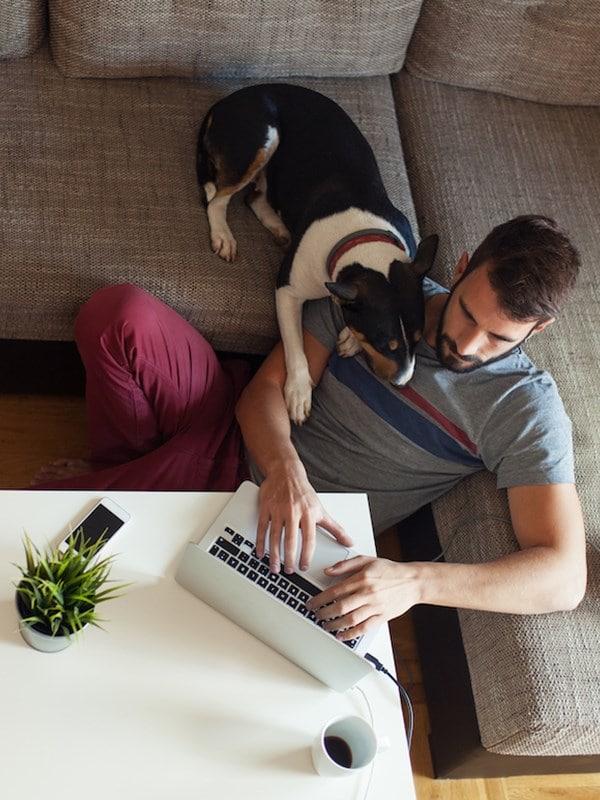Our lives have changed dramatically during the past month. The ongoing Coronavirus pandemic is affecting the entire world and none of us could have ever predicted this. What started as a worrying news story from the other side of the world is now affecting every single person across the UK, Europe and beyond.
Our jobs and livelihoods have changed dramatically. If you work for an essential service, beating COVID-19 or flattening the curve is now the top priority. Thousands of other workers have been furloughed and millions of people are now working from home. Almost all public spaces are closed, social distancing is the new normal and we’re adapting to this new way of life for at least the next few months.
The UK Government has given a strong message: Stay home. Protect the NHS. Save lives.
Home is the safest place to be right now. By staying home, we’re making it safer for essential service workers, protecting vulnerable people and protecting ourselves. Your home is your sanctuary, now more than ever, so it’s important to keep yourself safe from other household hazards during this time. Keeping your home safe also takes additional pressure away from the emergency services and there’s no better time than now to do a quick safety check.
Whether you have a houseful with family, live with housemates or you live alone, this blog post is full of practical tips to help you take the necessary fire safety precautions to protect your home.
1. Have a Fire Escape Plan
Having an up-to-date escape route is crucial to fire safety at home.
Go over your escape plan in your mind regularly, even if it seems straightforward, and make sure every member of your household knows the plan too.
The best way to escape your home is through your normal route, such as the front door, so make sure that keys are kept in an easily accessible place. Some locks in your home may be fiddly or have a special knack to them, if that’s the case then make sure everyone else in your household knows how to use them too.
Alternative Escape Plan
You should always have an alternative route out of your home in case your usual way is blocked. This could be a back door or a window, so the same precautions around keys and locks apply.
It’s also a good idea to keep your doorways and hallways clear, do not store large items like bicycles in such a way that would block your exit in an emergency.
If you have children, you could try a few practice drills with them as part of their new home learning routine.
2. Smoke Detectors
Smoke detectors can only save lives when they work properly. Use this time at home to teach the family about the importance of checking your smoke alarms and ensure they work correctly.
You should perform weekly checks on the smoke detectors in your home. You can do this by pressing and holding the test button until the alarm sounds.
You should also clean the smoke detectors regularly (using a vacuum cleaner) to keep them free from dust. If there’s too much dust build-up inside the detector, it may not detect smoke accurately, or even set off a false alarm! Why not build this into your regular cleaning routine from now on?
Never cover your smoke detectors, paint over them, move them around or disconnect them entirely.
If your home has a Carbon Monoxide (CO) detector, why not test this at the same time too?
3. Cooking Safely at Home
Now that meals out in pubs, restaurants and cafes are all on pause, more people find themselves having to cook at home. There’s also been a surge of panic buying in major supermarkets across the country, so many of us are having to be more creative with the meals we’re cooking as our favourites may not be on the shelves.
Having more time on our hands may encourage more culinary creativity, but remember these important safety tips during your home cooking experiments:
- Turn cooker ring off if you need to leave the kitchen for any reason
- Never leave young children unsupervised in the kitchen
- The same goes for the grill, turn it off if you need to leave the room and don’t leave it unattended
- Use a timer when you’re cooking food in the oven – no one likes a burnt dinner!
- Keep your oven, hob and grill clean and in good working order. A build-up of grease can ignite a fire, plus it’s more hygienic to always keep your appliances and food preparation surfaces clean.
- Avoid cooking if you have been drinking alcohol or are taking medication that makes you drowsy or tired.
- Check that your toaster is clean and away from curtains, towels or kitchen rolls. Most toasters will have a tray in the bottom that catches crumbs, you should empty this regularly. Always unplug the toaster before you clean it!
- Don’t put toasters under cupboards, if you’ve done this before you’ll have noticed that the underside of your cupboard gets easily scorched.
- Keep tea towels and cloths away from the cooker and hob.
- Don’t put anything metal in the microwave, check whether the plate or dish you’re using is microwave safe before using it.
4. Electrical Safety at Home
Besides cooking, almost all home-based activities require electricity, so usage is likely to be higher whilst most of the nation is in isolation at home.
Here are a few simple precautions you can take to improve the electrical safety in your home:
- Make sure that your plug sockets are not overloaded.
- Ensure that plugs, cables, leads and sockets are not visibly damaged.
- Check that your light fittings are not visibly damaged and that down lighters are in good working condition. Lights should not be flickering or turning on-off intermittently.
- Check that you are not storing combustible or flammable materials near your fuse box, electricity meter or electrical intake.
- Don’t use the top of the microwave for extra storage or block the vents on the side of the appliance.
- Never trail cables under carpets or rugs. You should also make sure that wires around your home do not pose a trip hazard.
- Never take any mains-powered electrical items, including hair dryers into the bathroom. Only certain types of shavers and electric toothbrushes should be used in the bathroom.
- Make sure that water or steam doesn’t get too close to plug sockets, especially in the kitchen or other humid areas.
- Always switch off your electrical items when you’re not using them.
- Check that you have RCD protection in your fuse box. If you’re in doubt, contact a qualified electrician.
- Never leave your mobile device charging unattended or overnight and always use the correct charger.
- Charge your mobile device on a clean, flat surface away from anything that could easily catch fire.
- Don’t charge your phone on or near a sofa, pillow or similar where it is more prone to overheat or get switched on accidentally.
Other Tips for Fire Safety at Home
Here are a few more tips for fire safety at home that you should be aware of:
Watch those Candles!
They may look pretty and make your home smell nice, but a candle is still an open flame. Never leave candles, oil burners, wax melts or incense sticks unattended. It’s easy to forget about them or go to bed without blowing them out.
Be Careful with Cleaning Products
Personal hygiene and cleanliness are vital in preventing the spread of COVID-19. But many of the cleaning products used to disinfect household surfaces are flammable and should be stored safely and away from any sources of ignition. You should never mix different cleaning products together, as they could cause chemical reactions, other health risks or even fires.
There’s also been a growing trend for making homemade surface cleansers and hand sanitiser, since it’s now very difficult to get hold of in shops or online. One of the main ingredients is isopropanol alcohol, which is also highly flammable, so make sure you store it safely with your other cleaning products.
Cigarettes and Ash Trays
Smoking inside your home poses an additional fire hazard, besides the well-known health risks associated with smoking. Never leave lit cigarettes balanced in an ash tray, as it’s so easy for them to get knocked over.
If you must smoke at home, then take a few precautions such as using a proper ashtray, emptying it regularly and safely, and never smoke in bed. However, there’s no better time than now to quit, being a smoker certainly won’t help with Coronavirus symptoms.
Also remember to take care with e-cigarettes/vapes, only use the charger supplied and never charge your vape with a phone, tablet or other charger. You should check your vape regularly whilst charging and never leave it unattended for an extended period of time. Like with mobiles, charge your vape on a clean, flat surface away from anything that could easily catch fire.
As we’re all living through unprecedented challenging times, keeping yourself safe is one of the most important things you can do right now. By looking after ourselves, that means we’re able to better help other people. By keeping our homes safe, we’re taking additional pressure away from the emergency services so they can focus on the battle against COVID-19.
Fire safety at home is an important topic at any given time, this article has covered some simple but important precautions you can take to reduce the risk of fires in the home.
For more information, read the Government’s Fire Safety Guidance advice. If you’re looking for fun games and activities to use with children, South Wales Fire & Rescue Service have produced some excellent educational games and resources to try at home.
Stay safe!



